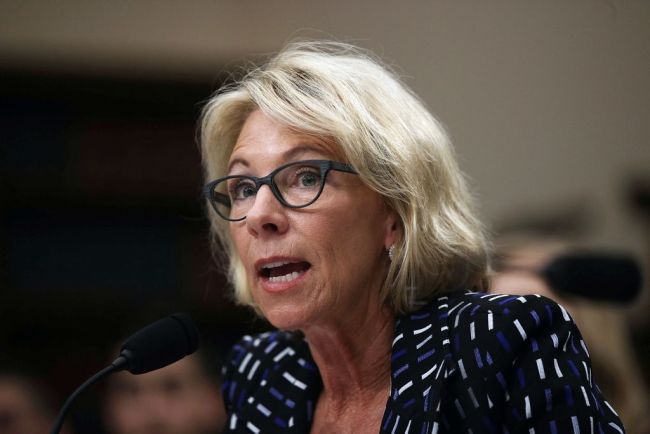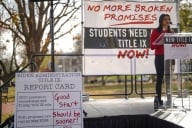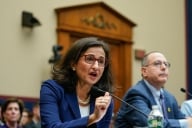You have /5 articles left.
Sign up for a free account or log in.

Education Secretary Betsy DeVos testifying to House appropriators.
Getty Images
The U.S. Department of Education is hitting pause on two of the Obama administration's primary rules aimed at reining in for-profit colleges.
Department officials said they will block a rule, set to take effect next month, that clarifies how student borrowers can have their loans forgiven if they were defrauded or misled by their college. The plan was first reported by Inside Higher Ed Wednesday.
The Trump administration will pursue a do-over of the rule-making process that produced that regulation, known as borrower defense to repayment, as well as the gainful-employment rule. The latter holds vocational programs at all institutions and all programs at for-profits accountable when they produce graduates with burdensome student loan debt.
While parts of gainful employment had already gone into effect, borrower defense was scheduled to become active on July 1. As that deadline approached, rumors had buzzed about the department’s plans for the regulations while politicians and advocacy groups weighed in with a flurry of letters.
Republican lawmakers have long been critical of both sets of regulations and made clear their intentions to roll them back after the election. Although gainful employment affects nondegree programs at many community colleges and borrower defense applies to all higher education institutions, the for-profit sector pushed back hard against both regulations. Consumer advocates view both rules as essential to protecting students against misconduct by colleges and have urged the administration not to walk them back.
The administration will issue a stay of borrower defense under Section 705 of the Administrative Procedure Act, which an Education Department official said allows federal agencies to halt the effective date of a rule pending judicial review. An association of California for-profit colleges is suing to block the rule. The official said the department is delaying implementation of the rule based on the lack of resolution of that case. (On Tuesday, Democratic attorneys general for eight states and the District of Columbia sought to intervene in the lawsuit to defend the rule.)
The Trump administration previously has cited that section of the Administrative Procedure Act to delay enforcement of other federal rules, including one from the Environmental Protection Agency.
The department will pursue an overhaul of the regulations by appointing separate rule-making committees to renegotiate the borrower-defense as well as the gainful-employment rules.
Education Secretary Betsy DeVos said fraud is unacceptable but that previous rule-making efforts missed an opportunity to get the regulations right.
“The result is a muddled process that's unfair to students and schools and puts taxpayers on the hook for significant costs,” she said. “It’s time to take a step back and make sure these rules achieve their purpose: helping harmed students. It’s time for a regulatory reset. It is the department’s aim, and this administration’s commitment, to protect students from predatory practices while also providing clear, fair and balanced rules for colleges and universities to follow.”
The Do-Over Process
The rule-making process, which requires federal agencies to seek public input via hearings and to appoint a committee of experts and stakeholders, can stretch out for months. The new round of rule making will begin with public hearings next month in Washington and Dallas. Department officials, speaking on background, said it’s too early to say what solutions negotiators will reach with respect to either rule. Higher education groups, for example, have criticized financial responsibility requirements in the borrower-defense rule as being onerous. And for-profits have argued that the gainful-employment regulations should apply to all institutions, regardless of tax status.
But negotiated rule making gives the secretary considerable influence in shaping the eventual outcome. DeVos will appoint the negotiators of each committee and their recommendations will ultimately be nonbinding if they fail to reach consensus, allowing the department to make the final call. The Obama administration, for example, released final versions of the two rules after each negotiated rule-making process failed to reach a consensus.
After early speculation this year that Republicans in Congress would attempt to eliminate borrower defense via the Congressional Review Act, lawmakers never took action involving the rule and it became apparent that they would defer to the administration on the issue. Republicans also didn’t include budget riders to defund gainful employment in the May spending deal that funds the government through the rest of the fiscal year.
Focus on For-Profits
The Obama administration crafted both sets of regulations in response to developments within the for-profit sector. The collapse of the for-profit chain Corinthian Colleges in 2015, which followed department sanctions, led to a flood of applications for loan discharge via borrower defense, a little-cited statute that took on renewed relevance after federal student loan debt ballooned in recent years. The existing statutory language was vague, however, and was based to a large extent on state law.
In response to Corinthian, the department sought to lay out a clear standard for students seeking loan discharge, which also held colleges accountable for fraud. In addition, the complex rule seeks to identify financially vulnerable colleges and to protect taxpayers and students in the event of their collapse. But many colleges complained that the language dealing with misrepresentations was too vague and that the regulations could have severe consequences even for colleges that did not intend to mislead students.
Under DeVos, the department’s efforts to stake out a strategy on the Obama regulations -- perhaps the biggest immediate issue in higher ed facing the new administration -- were likely hampered by the still low staffing levels for political hires. But the July 1 effective date for borrower defense provided a hard deadline for the DeVos team to sort out its approach.
Observers React to Suspension, Planned Overhaul of Rules
"We commend the department for moving forward to begin conversations that will really protect students from academic fraud," said Steve Gunderson, president and CEO of Career Education Colleges and Universities, in a statement. "Our sector has consistently supported this premise. Unfortunately, the Obama Department of Education chose to use this basic concept as a vehicle to continue their ideological assault on our sector’s very existence."
As the effective date for borrower defense drew closer, lawmakers, consumer advocates and higher ed groups weighed in. Senate Democrats last week wrote to DeVos last week asking her to confirm that she would implement and enforce the borrower-defense regulation.
The United Negro College Fund and the National Association for Equal Opportunity in Higher Education -- known as NAFEO -- meanwhile, told DeVos in a letter this week that borrower defense would have a detrimental impact on their member institutions. The two groups together represent more than 185 historically black colleges and predominantly black institutions. A department official cited that letter as an illustration of the kinds of institutional concerns that a new negotiated rule-making process would address.
"We believe further and thoughtful review of the regulation will be beneficial," said Cheryl Smith, senior vice president for public policy and government affairs at UNCF. "We hope to be active participants on any new negotiated rule making committee that the department sets up."
Massachusetts Attorney General Maura Healey, who led the intervention in the California for-profit case, said she plans to sue DeVos and the department over the suspension of the borrower-defense regulations, which she called a violation of federal law.
"Once again, President Trump's Department of Education has sided with for-profit school executives and lobbyists who have defrauded taxpayers of billions of dollars in federal loans," Healey said in a statement. "This is a betrayal of students and families across the country who are drowning in unaffordable debt."
Persis Yu, director of the National Consumer Law Center’s Student Loan Borrower Assistance Project, said starting over with the rule-making process "wastes taxpayer money and creates uncertainty for students who are wondering how to protect themselves from being ripped off by predatory schools."
The largest higher ed lobby groups said they were prepared to work with the administration to make improvements to existing regulations. Peter McPherson, president of the Association of Public and Land-grant Universities, called borrower defense and gainful employment critical, if imperfect, consumer protections.
"Changes can be considered, but we should not go backward in protecting students from institutions with fraudulent practices and terrible outcomes," he said.
Molly Corbett Broad, president of the American Council on Education, said the group looks forward to working with DeVos while "focusing on ensuring that students are protected from unscrupulous institutions."
Questions Remain
Both critics and supporters of the move acknowledged that it left many questions unanswered. The department hasn't made clear its intent on what it hopes will emerge from the negotiation process. It's not clear, for example, to what extent it hopes committee appointees will focus on financial responsibility in borrower defense, one of the regulation's most controversial aspects, or standard of proof for claims. And it's unclear whether gainful employment would maintain sanctions for programs as well as transparency for program outcomes.
Department officials told Inside Higher Ed the letter from UNCF and NAFEO illustrate the kinds of concerns they hoped to see addressed in an overhaul of borrower defense. And they said the definition of gainful employment was in need of thoughtful review as well.
The department also plans to include in the borrower-defense rule-making process a reconsideration of guidelines for guarantee agencies' debt-collection practices. In March, the department withdrew 2015 guidelines from the Obama administration barring those guarantee agencies from charging high fees to borrowers who quickly begin repaying their student loans after defaulting.
Dennis Carriello, a former lawyer at the Department of Education who now advises institutions including for-profit colleges and served on the last borrower-defense rule-making committee, said he was pleased to see the announcement.
"This is a good step," he said. "It's a chance to do the process right so students are protected and the schools know what the requirements are."
Carriello said to improve on the previous rule-making process, negotiators appointed by DeVos should include a diversity of experience and expertise as well as institution type.
Compared with other possibilities -- including elimination of borrower defense through the Congressional Review Act -- another round of rule making isn't the worst outcome for proponents of the regulations, said Justin Draeger, president and CEO of the National Association of Student Financial Aid Administrators.
"I feel like of all the scenarios to dramatically alter a regulation, having a negotiated rule making is the most transparent and is far better than just having Congress wipe it out entirely," he said.
But the process does create more uncertainty, he said, including for student borrowers who have already sought to clear their debt via borrower-defense claims.
In announcing the changes to the borrower-defense rule today, the department restated its commitment to discharging loan debt held by students who were already promised relief by the previous administration. And staff will continue to review pending applications for loan discharges. Congressional lawmakers and Democratic attorneys general have repeatedly sought updates in recent weeks on the department's progress -- or lack thereof -- in getting the loans of those borrowers discharged.
“Nearly 16,000 borrower-defense claims are currently being processed by the department, and as I have committed all along, promises made to students under the current rule will be promises kept,” DeVos said. “We are working with servicers to get these loans discharged as expeditiously as possible. Some borrowers should expect to obtain discharges within the next several weeks.”
But suspending the new borrower-defense rule removes a tool designed to help expedite processing of those claims. It's not clear whether the department under DeVos will be open to granting discharge to groups of students or will insist on processing those claims individually.
The department is looking to begin the rule-making process by this fall. But even under the rosiest of projections, new borrower-defense and gainful-employment regulations wouldn't go into effect until 2019. Under that timeline, the department would have to complete that process and publish a new rule by Nov. 1, 2018 -- the deadline for regulations to go into effect the following July.
Barmak Nassirian, director of federal relations and policy analysis at the American Association of State Colleges and Universities, said he was willing to give the Trump administration a chance. But Nassirian, who participated in previous rounds of rule making, said he worried about how a delay in regulations would affect student borrowers already suffering from debt they cannot repay.
"Justice delayed is justice denied for a lot of these folks who are living hand to mouth and really do have very strong arguments in favor of having their debt discharged," he said.








